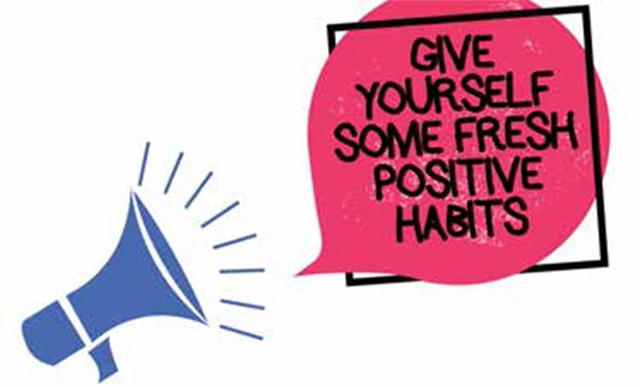- Mix
- Web-2021-03-24 | 02:28 pm

Think about it: if you always write, then you’re a writer. If you always practice sports, you’re an athlete and so on…. So your habits, whether positive or negative, essentially form your identity.
We are what we believe to be true about ourselves, so if I believe that I’m good at drawing, I would proudly say that I’m an artist. But was I born an artist? Most probably not! I strongly believed that I could become one by habitual practice. Thus, this is a deliberate decision where daily habits lead to desired outcomes.
What kind of person do you want to be? Ask yourself, "How would this person [the person you want to become] behave during any given situation?” Then emulate that behaviour.
Developing positive habits
One of the secrets to happiness is positive habits. The anticipation of the reward (not the reward itself) increases dopamine, the chemical in your body that gives you the feeling of excitement and happiness over a particular desired outcome. Since the secret is in the process, trust the process. Build your daily habits to your desired outcome.
Every habit is initiated by a cue that presents itself at the right time and place. This prompts you to perform the behaviour. If you want to eat healthier, don’t have sweets at home and replace them with fresh vegetables and fruits. You can help yourself more by:
• Making your habit attractive: A nicely decorated fruit plate on the table creates a craving for fruits
• Making it easy: What if these fruits are already washed, peeled, chopped and ready to eat? This would increase your probability of eating healthy
• Making it satisfying: Get the fruits you love, make a delicious healthy dip for your fresh veggies, prepare a fresh bowl of your favourite salad and garnish it to make it more enticing and satisfying
• Rewarding yourself: Behaviour rewarded immediately is likely to be repeated, so give yourself credit for eating healthy. Tell your friends about it using the present tense (not future), such as "I don’t smoke [instead of I’m trying to quit smoking this year]”.
If you want to reduce a specific negative behaviour, the opposite applies; if you wish to engage less in social media on your phone, then hide the app and turn off notifications. If you’re going to quit smoking, don’t hang out with smokers.
An enabling environment
When you create an enabling environment, you create the conditions for making your desired habit automatic. If you want to exercise in the morning, prepare your workout clothes the night before. If you want to read at night, leave a book on your pillow earlier in the day, or prepare a reading corner with a comfy couch and a small library of books.
My art teacher once told me that if I put back my colours in their box and cleared the drawing table, I would be less likely to draw the next day. He advised that I keep a specific place for drawing with everything laid out. So, it would be easier to start drawing and this space would be motivational in keeping to the habit of drawing daily. After all, our habits guide nearly half of our daily actions!
Remember, if you become even just one per cent better at what you do daily, positive change is inevitable, leading to remarkable results over time.
Reprinted with permission from Family Flavours magazine
-
 Will Trump end up like Kennedy?2026-02-03
Will Trump end up like Kennedy?2026-02-03








